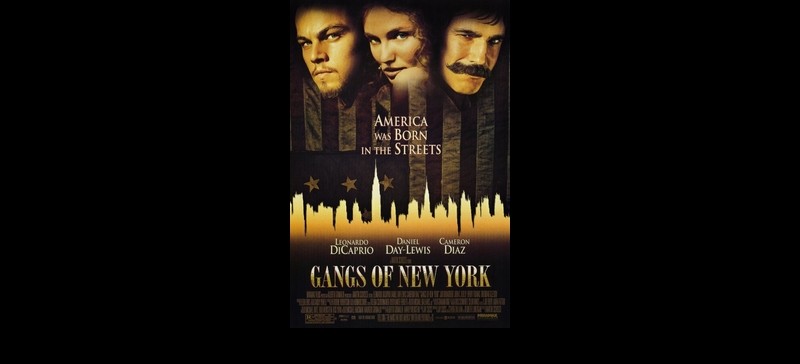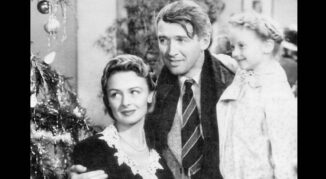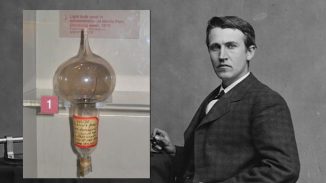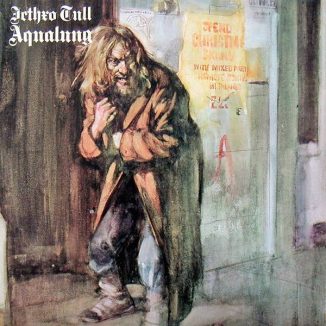21 years ago today, Gangs of New York premiered in theaters. Martin Scorsese’s colorful and gritty depiction of gangland violence among the poor immigrant residents of New York City’s Five Points received 10 Academy Award nominations. While winning none, Daniel Day Lewis’ mesmeric portrayal of street gang leader Bill the Butcher won him several other awards. Grossing nearly $200 million worldwide, the project had taken Scorsese nearly 20 years to develop after reading a book called Gangs of New York: An Informal History of the Underworld. READ more… (2002)

Loosely-centered around the life and times of Irish immigrant waves to America during the Civil War and following the Potato Famine, the film was repeatedly praised for its historical accuracy. Washington University professor Tyler Anbinder said Scorsese “couldn’t have done much better.”
MORE Good News on this Date:
- The Louisiana Purchase from France was signed in New Orleans (1803)
- Happy 74th Birthday to musician-composer Alan Parsons (1948)
- The Berlin Wall was opened for the first time to West Berliners, who were allowed one-day visits to relatives in the Eastern sector for the holidays (1963)
- NATO began peacekeeping in Bosnia (1995)
- Vermont‘s Supreme Court ruled that homosexual couples are entitled to the same benefits and protections as married heterosexuals (1999)
- The first same-sex civil partnerships in Scotland were celebrated (2005)
77 years ago today, It’s a Wonderful Life, the Hollywood film directed by Frank Capra and starring James Stewart and Donna Reed, premiered in New York.

The Christmas drama portrays a man who had put aside his personal dreams, in order to help others in his community. His suicide attempt on Christmas Eve causes his guardian angel to intercede and show him how rich (or poor) the town would be if he had never stayed to serve his neighbors.
Although It’s a Wonderful Life was initially unsuccessful at the box office, it was nominated for five Academy Awards, including Best Picture, has been recognized by the American Film Institute as one of the 100 best American films ever made, and has become a timeless Christmas classic. A clerical error caused the copyright to expire in 1974, so it was soon broadcasting everywhere annually. WATCH 10 things you didn’t know about the movie… (1946)
Happy 40th Birthday to actor, writer and comedian Jonah Hill.

Known for his comedic roles in films such as Accepted, Knocked Up, and 21 Jump Street, Hill also shines in more serious films. In 2012, he received an Oscar nomination for Best Supporting Actor for his performance in Moneyball. His second dramatic role, in The Wolf of Wall Street, earned him another Oscar nod in the same category. (1983)
On this day 142 years ago, on the day with nearly the longest hours of winter darkness, Thomas Edison gave his first demonstration at a news-press event of his version of a glowing incandescent light bulb.

Edison and his associates worked for fifteen months in Menlo Park, New Jersey, on at least 3,000 different theories to develop a more efficient electric lamp. He tested no fewer than 6,000 plants searching for a long burning substance, until he settled on a carbonized cotton fiber filament to house inside his hand-blown glass vacuum bulb.
“The electric light has caused me the greatest amount of study and has required the most elaborate experiments,” he wrote. “I was never myself discouraged, or inclined to be hopeless of success. I cannot say the same for all my associates.” (1879)
And, 56 years ago today, the Scottish vocalist–flautist–guitarist Ian Anderson formed a blues band named after an 18th-century agriculturist, Jethro Tull. 
Best known for their signature progressive rock albums Aqualung and Thick as a Brick, the group (which began in Blackpool, England when Anderson was “on the verge of starvation” in a janitor’s job) went on to sell an estimated 60 million albums worldwide.
Because he was living in a cold one-room apartment, Anderson bought a large overcoat to keep himself warm, and also a flute—both of which would distinguish his early stage presence. “I didn’t want to be just another third-rate guitar player who sounded like a bunch of other third-rate guitar players. I wanted to do something that was a bit more idiosyncratic, hence the switch to another instrument,” explained Ian in an interview. “When Jethro Tull began, I think I’d been playing the flute for about two weeks. It was a quick learning curve … literally every night I walked onstage was a flute lesson.” Did you know Jethro Tull put out a fabulous Christmas LP? (1967)
80 years ago today, two pilots who were sworn enemies experienced a remarkable convergence of camaraderie and respect in the airspace over Germany during World War II. 2nd Lt Charles “Charlie” Brown had just flown a successful bombing run on industrial targets in Bremen, Germany in his B-17. The plane named “Ye Olde Pub” was severely damaged by fire from German fighters, with crew members either killed or wounded.
Pilot Brown could only keep his plane aloft at a low altitude, and saw a Luftwaffe pilot Franz Stigler flying alongside, clearly with an opportunity to shoot down the crippled bomber—but he did not do so. Stigler was by then an ace with 27 victories, and Brown, a self-described farm boy from West Virginia, was flying his first mission. Inexplicably, the German pilot escorted Brown, flying behind him, beyond German-occupied territory, so as to protect it from ground fire. Stigler later said he had never seen a plane so damaged—with nose and tail completely missing—yet still flying. Before turning away he saluted the American fledgling pilot.
Brown’s superiors kept the incident a secret, but decades later, after an extensive search, Charlie located the German pilot and the pair met, 50 years after the incident, and developed a friendship that lasted until Stigler’s death in 2008. The two flying aces were astonished to discover that they had been living less than 200 miles apart—Stigler having emigrated to Vancouver, Canada, and started a successful business, with Charlie living across the bay in Seattle.
Stigler later recalled the words of one of his commanding officers from Jagdgeschwader 27, Gustav Rödel, “If I ever see or hear of you shooting at a man in a parachute, I will shoot you myself.” Stigler figured it was the same situation, saying “To me, it was just like they were in a parachute. I saw them and I couldn’t shoot them down.”
Brown believed that his commanding officers kept it secret because, “Someone decided you can’t be human and be flying in a German cockpit.” He was finally able to find Stigler, after years of trying, by writing a letter to a combat pilot association newsletter. A few months later, he received a letter from Stigler. The incident was later written about by Adam Makos in the biographical novel A Higher Call. (1943)
SHARE the Music, Milestones, and Memories…




















[…] post Good News in History, December 20 appeared first on Good News […]
[…] Author: Good News Network / Source: Good News Network […]
[…] Posted From: https://www.goodnewsnetwork.org/events061220/ […]
[…] Brought to you by:- https://www.goodnewsnetwork.org/events061220/ […]